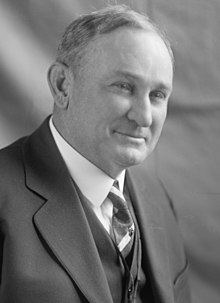
Back جوزيف تايلور روبنسون Arabic جوزيف تايلور روبنسون ARZ جوزف تیلور رابینسون AZB Joseph Taylor Robinson German جوزف تیلور رابینسون Persian Joseph Taylor Robinson Finnish Joseph Taylor Robinson French ג'וזף טיילור רובינסון HE Joseph Taylor Robinson Hungarian 조지프 로빈슨 Korean
This article is written like a personal reflection, personal essay, or argumentative essay that states a Wikipedia editor's personal feelings or presents an original argument about a topic. (November 2021) |
Joseph T. Robinson | |
|---|---|
 | |
| Senate Majority Leader | |
| In office March 4, 1933 – July 14, 1937 | |
| Deputy | J. Hamilton Lewis |
| Preceded by | James Eli Watson |
| Succeeded by | Alben W. Barkley |
| Senate Minority Leader | |
| In office December 3, 1923 – March 4, 1933 | |
| Deputy | Peter G. Gerry Morris Sheppard |
| Preceded by | Oscar Underwood |
| Succeeded by | Charles L. McNary |
| Chair of the Senate Democratic Caucus | |
| In office December 3, 1923 – July 14, 1937 | |
| Preceded by | Gilbert Hitchcock (acting) |
| Succeeded by | Alben W. Barkley |
| United States Senator from Arkansas | |
| In office March 10, 1913 – July 14, 1937 | |
| Preceded by | William M. Kavanaugh |
| Succeeded by | John E. Miller |
| 23rd Governor of Arkansas | |
| In office January 16, 1913 – March 8, 1913 | |
| Preceded by | George Washington Donaghey |
| Succeeded by | William Kavanaugh Oldham (Acting) |
| Member of the U.S. House of Representatives from Arkansas's 6th district | |
| In office March 4, 1903 – January 14, 1913 | |
| Preceded by | Stephen Brundidge Jr. |
| Succeeded by | Samuel M. Taylor |
| Personal details | |
| Born | Joseph Taylor Robinson August 26, 1872 Lonoke, Arkansas, U.S. |
| Died | July 14, 1937 (aged 64) Washington, D.C., U.S. |
| Political party | Democratic |
| Education | University of Virginia (LLB) |
Joseph Taylor Robinson (August 26, 1872 – July 14, 1937) was an American politician who served as United States Senator from Arkansas from 1913 to 1937, serving for four years as Senate Majority Leader and ten as Minority Leader. A member of the Democratic Party, he previously served as the state's 23rd governor, and was also the Democratic vice presidential nominee in the 1928 presidential election.
After studying law at the University of Virginia, Robinson returned to Arkansas, winning election to the Arkansas General Assembly. He won election to the United States House of Representatives, serving from 1903 to 1913.[1] He won election as governor of Arkansas in 1912, but resigned from that position in 1913 to take a seat in the Senate. In the Senate, Robinson established himself as a progressive and strong supporter of President Woodrow Wilson. Robinson served as the chairman of the 1920 Democratic National Convention and won election as the Senate Minority Leader in 1923. He sought the Democratic presidential nomination in the 1924 election and was nominated as the Democratic vice presidential nominee in 1928. The Democratic ticket of Al Smith and Robinson lost in a landslide to the Republican ticket of Herbert Hoover and Charles Curtis.
The Democrats took control of the Senate after the 1932 Senate elections and elected Robinson as Senate Majority Leader. He passed Franklin D. Roosevelt's New Deal programs through the Senate, alienating some of his colleagues with his autocratic style. In the midst of debate over the Judicial Procedures Reform Bill of 1937, Robinson died due to heart failure.
- ^ "S. Doc. 58-1 - Fifty-eighth Congress. (Extraordinary session -- beginning November 9, 1903.) Official Congressional Directory for the use of the United States Congress. Compiled under the direction of the Joint Committee on Printing by A.J. Halford. Special edition. Corrections made to November 5, 1903". GovInfo.gov. U.S. Government Printing Office. November 9, 1903. p. 5. Retrieved July 2, 2023.